Note: This is part 3 of a 4-part series on overcoming common barriers to learning. Tune in every Thursday for more insight from our Manager of Instruction, Jodie Westerman.
Last week we discussed how to eradicate test anxiety through positive self-perception. For some students, however, negative self-image is less generalized and more subject-specific.
Today we’ll look at some common ways test prep students experience subject-specific bias and how our tutors use proven pedagogical theory to position these students for success.
What is subject-specific bias?
We’ve all seen it—the student who aces every verbal test but bombs math (or vice versa.) From an early age, these students are labeled “math people” or “verbal people” and learn to identify their own strengths accordingly. A “math person” is said to have a way with numbers, learning new mathematical concepts with ease. She is usually the first student to raise her hand in math class and the last person the teacher expects to fail a test. Similarly, a “verbal person” reads passages and composes sentences masterfully. He does not struggle to grasp an author’s meaning, nor does he balk when given an essay assignment. He is the one you go to for help when you don’t know what to write about.
In each of these cases, the individual shows genuine and innate talent for a given skill-set. Whereas “math people” and “verbal people” are among the more common titles anointed to young minds, an array of additional titles abounds. A musically gifted piano player may have “a natural ear,” whereas a talented young actor may have “the it factor.” From “aficionados” to “gifted artists” to simply “born geniuses,” there is no shortage of words to describe innate talent.
With so much emphasis on talent, it’s little wonder students come to equate talent with likelihood to succeed. After being told time and again what we are “good” at, it’s only natural that we should believe the odds of succeeding in other areas are slim. After all, aren’t the naturally talented folks already miles ahead? Thus, by the time a student prepares for college entrance exams, it is possible she has developed a serious bias against certain academic subjects.
What does subject-specific bias look like in test prep students?
Perhaps nowhere is this subject-specific bias more apparent than in SAT and ACT test preparation. Ready-made exams designed to quantify academic strengths and weaknesses, the SAT and ACT are the worst nightmares of students who are math-phobic, verbal-phobic, or science-phobic. Never mind the fact that these exams are highly coachable; students who struggle in a given section almost always cite their personal weaknesses as impediments to success.
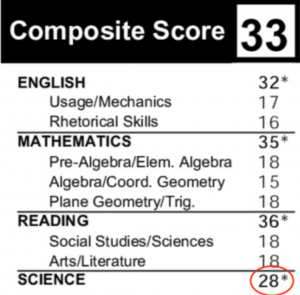
An ACT student, for example, may view a comparatively low science score as yet another sign that he is innately bad at science. If that same student had been told throughout his life that he was more of a “verbal person,” “music person,” or some other non-Science adjective, he might believe his lower score reflected his potential rather than his current abilities.
Subject-specific bias goes deeper than simply recognizing one’s own strengths and weaknesses. Instead, students fear that a lack of talent will prevent them from succeeding—sometimes even at the things they desperately want. When it comes to standardized test preparation, this attitude can be fatal. Take the high-scoring ACT student above, for example. This student clearly excels at almost every section of the ACT, and his score is similarly competitive. Yet, the difference between, say, a 33 and a 35 on the ACT is vast. A higher ACT score might help this student secure a spot at his dream school, or it might make him eligible for a scholarship. Yet, if this student doesn’t improve his lowest score—science—it is unlikely that he can improve his composite score by any significant margin.
As we discussed in the first blog of this series—Overcoming Disappointments— skills are malleable and students can always improve. When a student is biased against a certain subject, however, he is far less likely to invest the time and energy necessary to get better. Here are just a few things I’ve heard my SAT and ACT students say when grappling with subject-specific bias:
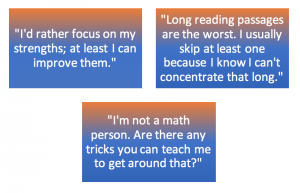
In each of these cases, the student is approaching test prep from the perspective that she can’t really improve her weaknesses. Instead, she wants to game the system and do some damage control.
If the only ingredient to success were innate talent, these attitudes might make sense. Investing time and effort in something when others will always be better simply doesn’t make sense. But is “talent” the only thing that matters when determining what an individual will or will not do well? And by emphasizing “talent” over other factors like hard work, grit, and perseverance, are we doing a serious disservice to students who might otherwise flourish?
What is grit theory?
For centuries, psychologists and social scientists have sought to understand the secret to success. Some credit raw talent, others dumb luck. But a few have dug deeper to really uncover that extra something all highly successful people share. According to noted psychologist Angela Duckworth and her associates, that thing is sheer, unabashed grit.
Grit takes many forms. It’s the kid who doesn’t make the football team on his very first try but comes back the following year to try again. It’s the student who fails a test but then shows up every day to office hours until she earns a passing grade. It’s the young author who is rejected by one hundred publishing houses before she finds the one who believes in her story. In short, grit is the effort one is willing to put in even when the going gets tough.
Of course, talent isn’t without its uses. A student with a natural aptitude for math, for example, may struggle less than her classmates and require less time to master a concept. But talent is only one piece of the puzzle; and, according to Duckworth, it’s not a very big piece.
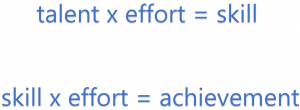
The equation above quantifies grit theory’s approach to success. As you can see, effort matters twice as much as talent when determining if a person will succeed. A person can possess impressive talent but be too complacent to transform that talent into skill. Similarly, a person might take the time to build a skill but never do anything challenging with it. As a test prep tutor, I see this every day. The gifted student who doesn’t do her homework is unlikely to improve, whereas the gritty student who works ten times harder beats the gifted student’s score by a landslide.
When it comes to subject-specific bias, this phenomenon is even more apparent.
To illustrate, consider two of my SAT students—we’ll call them Carson and Mark. Both students enrolled with clear bias toward reading and writing and against math. Some might even say they had “math anxiety.” With comparatively higher verbal scores, it was clear that Carson and Mark would need to invest most of their time in math if they wanted to improve their overall SAT scores. The difference in the way each student approached this challenge, however, was remarkable. Carson would often avoid the topic of math altogether. During new lessons, he was quiet and withdrawn. He also neglected his homework, often voluntarily completing verbal assignments while “forgetting” to do his math. Mark, on the other hand, embraced the challenge head-on, completing hours of homework and often requesting additional practice sections “just to keep him busy.”
To be honest, I was expecting Carson to improve more rapidly than Mark. Carson was an AP student with a gifted and talented track record. His parents, teachers, and counselors raved about him, and he even described himself as a “perfectionist.” Mark, on the other hand, was a below the median test-taker. He described himself as a “struggler,” and warned me that it might take him awhile to understand concepts. I was prepared for the worst. But Mark quickly surprised me! As a result of his hard work, Mark raised his math score by over 200 points, ultimately earning a composite score much higher than Carson’s.
Do I doubt that Carson had certain academic gifts? Absolutely not. What this experience taught me was simple: effort counts more.
How do ArborBridge tutors cultivate grittier students?
When it comes to test prep, we believe in tough love. Students need to know their strengths and weaknesses, but only insofar as that knowledge facilitates growth. When a student demonstrates subject-specific bias, ArborBridge tutors take the following steps to address it head-on:
1) Purposeful practice
A key component of grit theory is mindful and purposeful practice. It’s not enough to simply do something again and again. (If it were, all my singing in the shower would have landed me a record deal by now!) Rather, students need to take concrete steps to improve every day. A student who struggles with a given subject should work twice as hard to make up the difference. Here are just a few ways tutors make this possible:
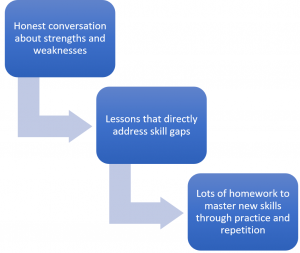
2) High standards
Gritty students aren’t born; they’re made. In fact, grit theorists identify a linear correlation between a person’s age and their grit. In general, the more challenging life experiences we encounter, the grittier and more perseverant we get. Unfortunately, teenagers are the least gritty they will ever be. Ideally, they haven’t been through too many tough circumstances just yet. And they’re still learning what it means to identify and prioritize goals. By establishing high expectations of his student from the get-go, a tutor sends a clear message that he believes his student is capable of accomplishing anything she puts her mind to.
3) Research-based goals
While it’s imperative that a tutor expect high work ethic from his student, he should also be sure to set reasonable goals and expectations. An important part of this process is understanding the test prep learning curve. In general, test prep students at the bottom of the curve tend to progress more rapidly than students at the top. The higher a student’s score, the harder it is to earn more points.
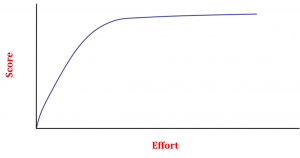
For students with subject-specific bias, this can be especially frustrating. They may work diligently to improve upon a weakness, only to find that they hit a wall. It is at this point that many students give up. However, ArborBridge tutors keep working to identify every possible opportunity for continued growth. It is this tenacity that allows our students to really push the boundaries of what they thought was possible.
What does this mean for students?
Grit theory is good news for students of all types. From the gifted and talented to those who struggle, all students can benefit from increased effort. But for students with subject-specific bias, the theory of grit affords us some really important insights. First, labels like “math person” or “verbal person” are simply descriptions of a person’s starting place. They do not and cannot put a ceiling on a person’s potential. Second, as much as talent may give a person a head start in the race to success, effort counts more. Finally, through good study habits, empowering mentorship, and informed goal-setting, all students can expand upon their current abilities.






